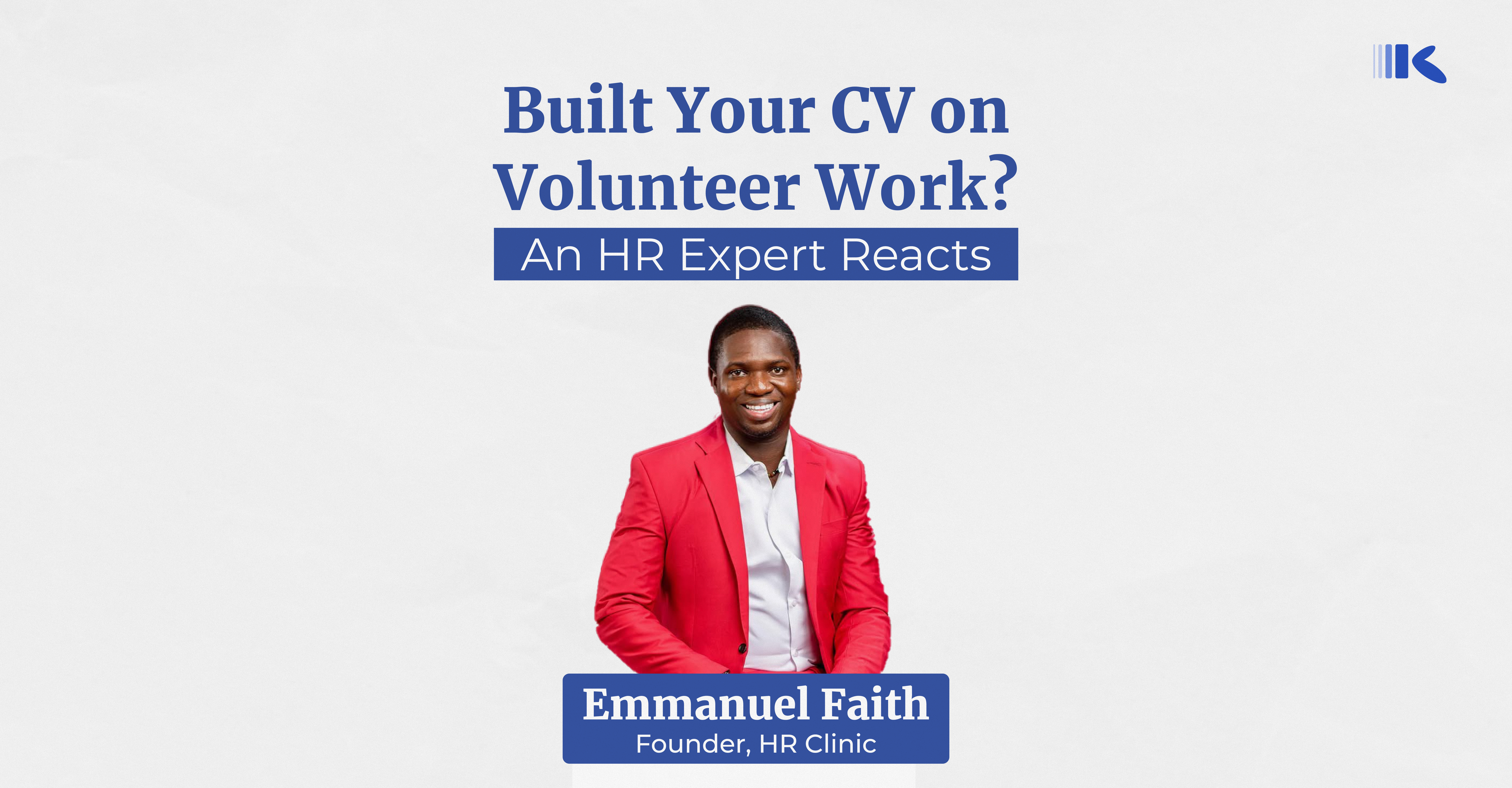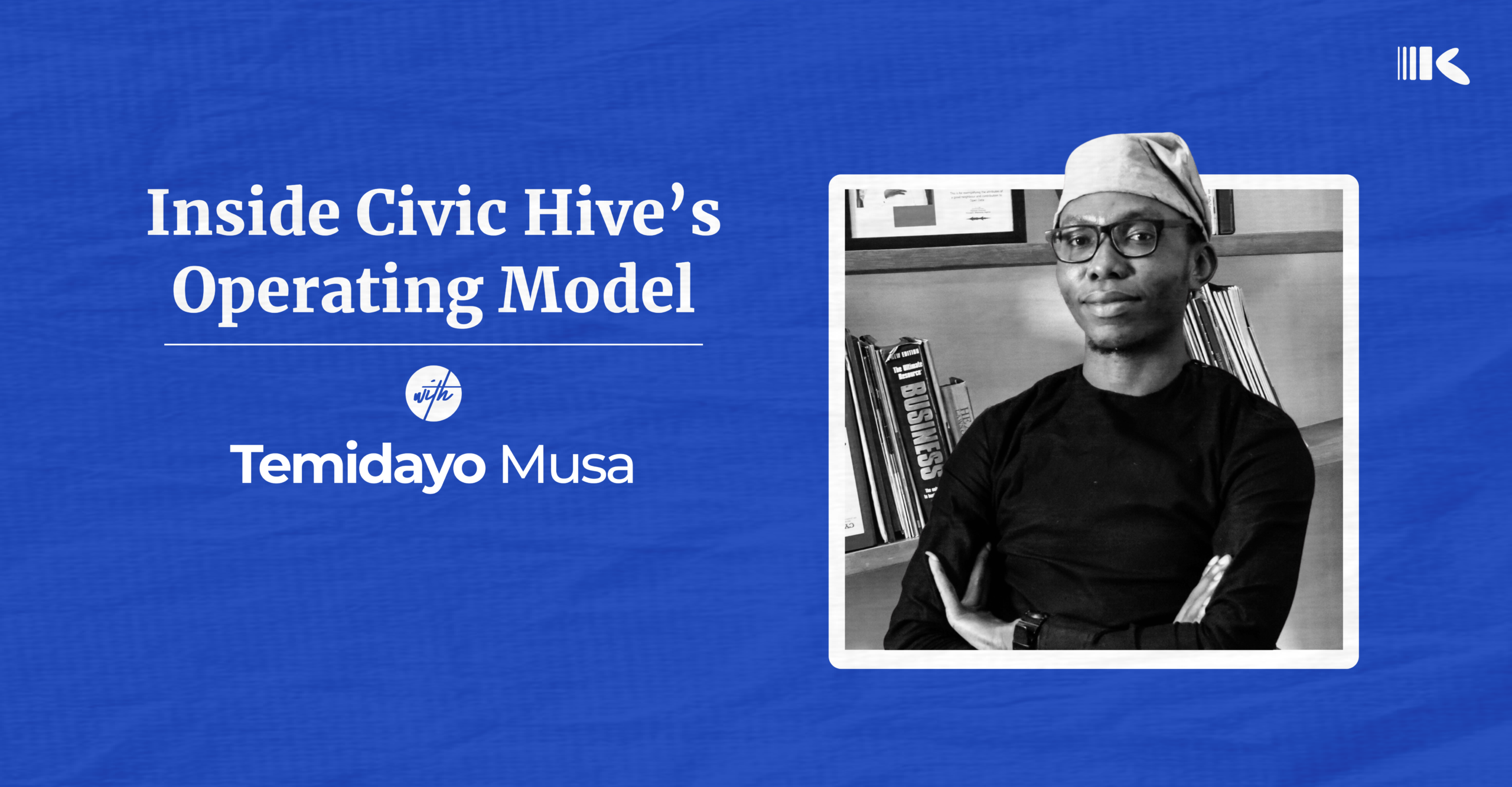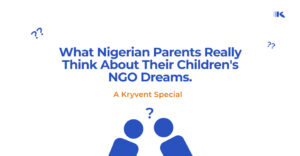What’s the most repeated advice given to young people trying to enter a field?
Many versions of the same line: “Go and volunteer.”
And honestly, it’s solid advice. Clichés exist for a reason. If you read our last conversation with Abisoye, you’ll remember how her career was shaped through volunteer experience.
At Kryvent, one thing we’ll always do is offer different perspectives on the same conversation. In that spirit, I sat down virtually with an HR professional, one of Africa’s Top 100 Leaders according to SeamlessHR.
Welcome to another Kryvent interview.
Pelumi: Can we meet you?
Guest: Hi Pelumi, my name is Emmanuel Faith. I’m an HR Manager and HR Consultant. I lead the HR team at a FinTech company. I run HR Clinic, a platform focused on running consulting sessions for pre-seed and post-MVP founders.
What’s your favourite part about being an HR professional?
That you can make a decision that would change lives forever. It is very interesting. I have made different types of decisions and implemented policies in different places that have positively impacted lives.
For instance, at one of the places I worked, I implemented a Vehicle Assistance Policy. Thankfully, some employees got a car. Some of them still drive the car they bought in 2022. If I hadn’t implemented that policy, and the current cost to buy a car (APC-inflated cost), who knows if they would have been able to?
The fact that I can implement something innovative and progressive that positively affects people’s standard of living means a lot to me.
Also, I like that I wake up every day not knowing what problem I am about to solve. Because it’s people, and people have a myriad of problems. To be honest, it’s the first reason more than the second.
People tell young people all the time, “Volunteer. You can put it on your CV.” From an HR perspective, how much weight does volunteering actually carry?
A lot, if it’s done the right way. Emphasis on the right way.
The right way, for example, means asking: are you at the right stage of your career where you need to volunteer?
For instance, are you about to make a career switch? If you’re moving from customer experience to data analysis, you can volunteer in a data analyst role. What you’re trying to do is gather enough experience that would sit on your resume or communicate to recruiters that you have done something data-related.
Are you just starting out in your career — say in HR — and you can’t find entry-level roles? But there’s an HR consultancy hosting an HR event and they ask you to come and volunteer? That makes sense.
The timing, where the volunteering is done, and why it is being done are all very important.
Does working at a startup without pay count as volunteering? Is that label reserved for nonprofits?
That’s a tricky question. There is no direct answer.
Look at my earlier example. Or let’s say you studied pharmacy and you work in Customer Experience at a pharmacy as your nine-to-five. But you’re trying to get into data analysis. You have been learning Python, Power BI, and other relevant tools.
The pharmacy runs on a rotation, so you work shifts. Then there’s a startup that has not raised funds yet and is still building its product. They bring you on board to use your skills in data analysis or another area. That is a volunteer opportunity, and it is helpful for your growth. You can build your portfolio and start applying for paid roles.
You might even be lucky. During your volunteering for six months or a year, the startup could raise funds and decide to pay you.
Remember, the real question is: why are you volunteering?
Are there situations where unpaid or volunteer work can appear in the work experience section of a CV instead of under volunteering? Does it depend on the significance of the role or achievements?
The truth is that you are the one who knows. CVs are not rigid. The recruiter does not know. You can write it under your work experience. Primarily, it is work experience. If you want to list it there, by all means, do so. You are not obliged to tell recruiters whether or not you were paid in that role.
The people who separate volunteer work from their work experience on their CV usually already have sufficient professional experience. Let me illustrate.
You are a recent graduate who has interned at KPMG, PWC, and Afrinvest. You even went for a twelve-week internship at Bank of America. But you also volunteered with EduBridge Academy or Cowrywise. In that case, the volunteer roles would stay under volunteering.
However, if throughout your undergraduate years, your routine was mostly wake up, eat, read, but you also served as the campus ambassador lead at OAU and community lead for EduBridge Academy, then you do not have to list those roles as volunteer work. You can list them as work experience.
It all comes down to what you have done. Is volunteering your core, or is it there to highlight other things you have accomplished?
What does volunteer experience communicate on a mid-career CV?
Nothing exceptional. It depends.
Is it still strategic beyond the early stages of a career?
Yes. The question is, does it align with your future goals?
For example, I volunteered at TalentQL some time ago to help develop a curriculum for their senior engineers. It was strategic for me. They later paid me for it, but I was initially doing it to double down on a particular competence. You can volunteer to build depth in a skill area or to position yourself for specific opportunities.
Right now, I volunteer with two global platforms as a sports journalist. I write about women’s football. It is strategic for me. It puts me in conversations around diversity and inclusion, and it also positions me for an opportunity I am looking to explore in the future. What that also means is that if there is an opportunity in women’s football today, I can apply. I have been writing for close to three years now.
As you approach the middle of your career, volunteering becomes a strategic decision. So we are back to the core question, why are you volunteering? Do you want to build competence? Do you want to boost your social or soft skills?
I know people who volunteer to teach at EduBridge Academy. They do not just want to be exceptional professionals. They want to be able to teach their knowledge.
If someone has only ever worked in the nonprofit they built, how can they best present that experience on a CV?
A nonprofit is a company. It is just as demanding as running any other kind of company. Do not look down on your experience or question how to present it.
You know what, I actually have a video on How to write a winning CV.
What advice would you give to a nonprofit leader struggling with inconsistent or unresponsive volunteers?
Sign up with HR Clinic. Let us help you build and motivate your team to deliver excellence.
That aside, I think nonprofit founders need to hire — yes, I said hire — deliberately. Hire people whose personal goals align with the organisation’s vision.
For example, if you’re an NGO focused on recycling and there is a potential volunteer who wants to apply for Erasmus Mundus, Commonwealth Shared Scholarships, or the Mastercard Foundation program, hiring someone like that is a double-edged sword. Yes, they are coming to add value to your organisation, but they are also coming to build their portfolio. And because they are focused on building that portfolio, they are more likely to do good work. It is better to hire such people.
Also, set clear expectations. I manage Fervora, and our team is made up of volunteers. I ask questions like how many hours they can give weekly. I inform them in advance if those hours need to increase because of the peculiarities of that month. I do not expect more than the agreed hours, and there is a set deliverable tied to those hours.
If people are not meeting the expectation, let them go. It is already an NGO. You do not need the extra stress of forcing people who are not interested to stay.
Free resource: 10 Errors that Founders Should Not Make.
How can nonprofit organisations create environments where volunteers can grow and thrive professionally?
Simple. Career mapping. Take note of these three things:
1. Clarity of vision and mission:
Let your team know the big goal. What is the gap you are trying to close, and what is the solution you are offering ?
2. Show them the possibilities.
For example, at Fervora, our current focus is storytelling about African women footballers. In the long run, we want to be at the centre of conversations where stories and data around African women footballers are concerned.
Last year, we published a report that was widely read by journalists around the world. We were featured on Zikoko and published on a global platform. Even though we are just six or seven people on the team, we have shown our volunteers that we are shaping the narrative around women’s football, one article, one design, one Twitter Space at a time.
It is important to show that big picture and how whatever they do contributes to it.
3. Connect their work to career possibilities.
I told our video editor recently that she would get a better gadget soon, and we would start producing videos that platforms like CAF or FIFA might want to repost.
We wrote an article on two African footballers last year, Barbra Banda and Tabitha Chawinga. They both read it and retweeted it. That is possibility.
Even though I wrote the article, imagine if someone else on the team had. That would go on their resume as: “I wrote a piece that was retweeted by the CAF African Player of the Year.” That is a powerful moment to own professionally.
To recap:
- Create the vision. Sell the vision and make it plain.
- Show a clear picture of the problem they are helping solve and how their daily contributions matter.
- Connect their work to their career path and show them what is possible.
You shared so generously. Thank you for speaking with us Emmanuel Faith.
Thank you for having me!
Emmanuel Faith runs a YouTube channel where he discusses career, employability, and lifestyle with professionals from various fields. If you’re not subscribed yet, you’re definitely missing out. Go subscribe now!


